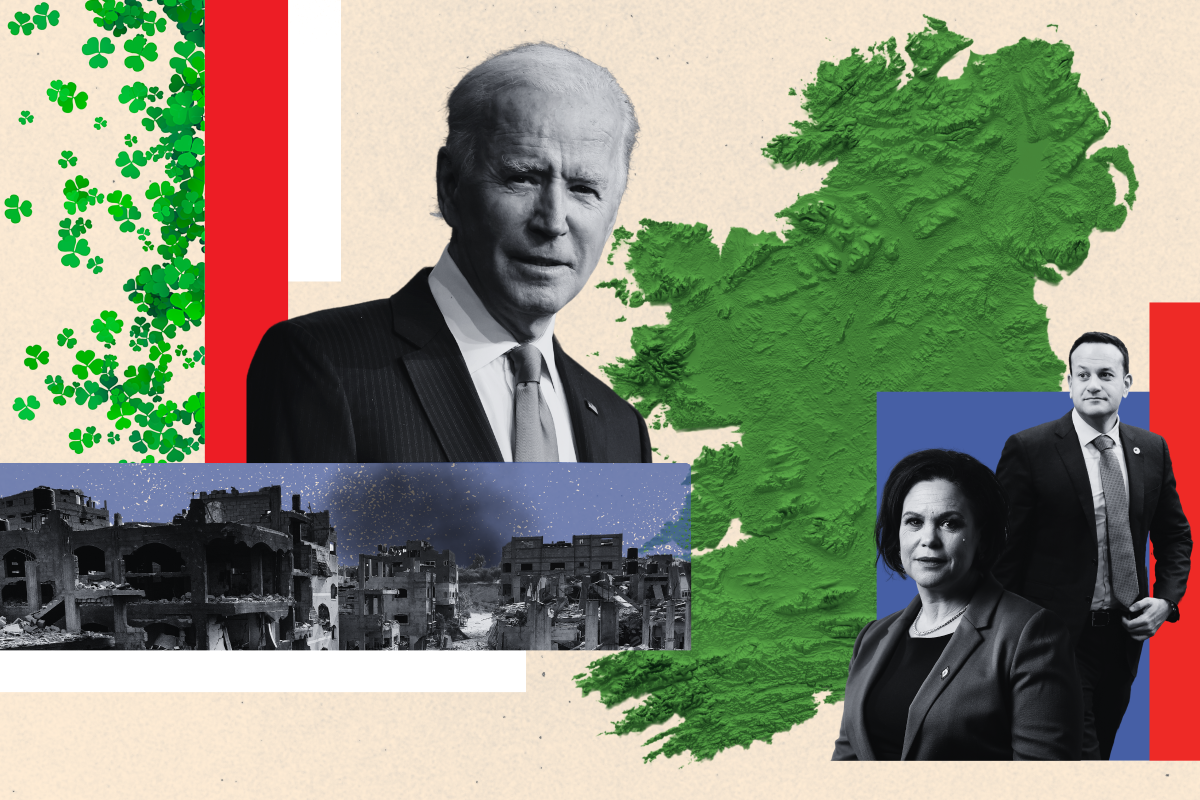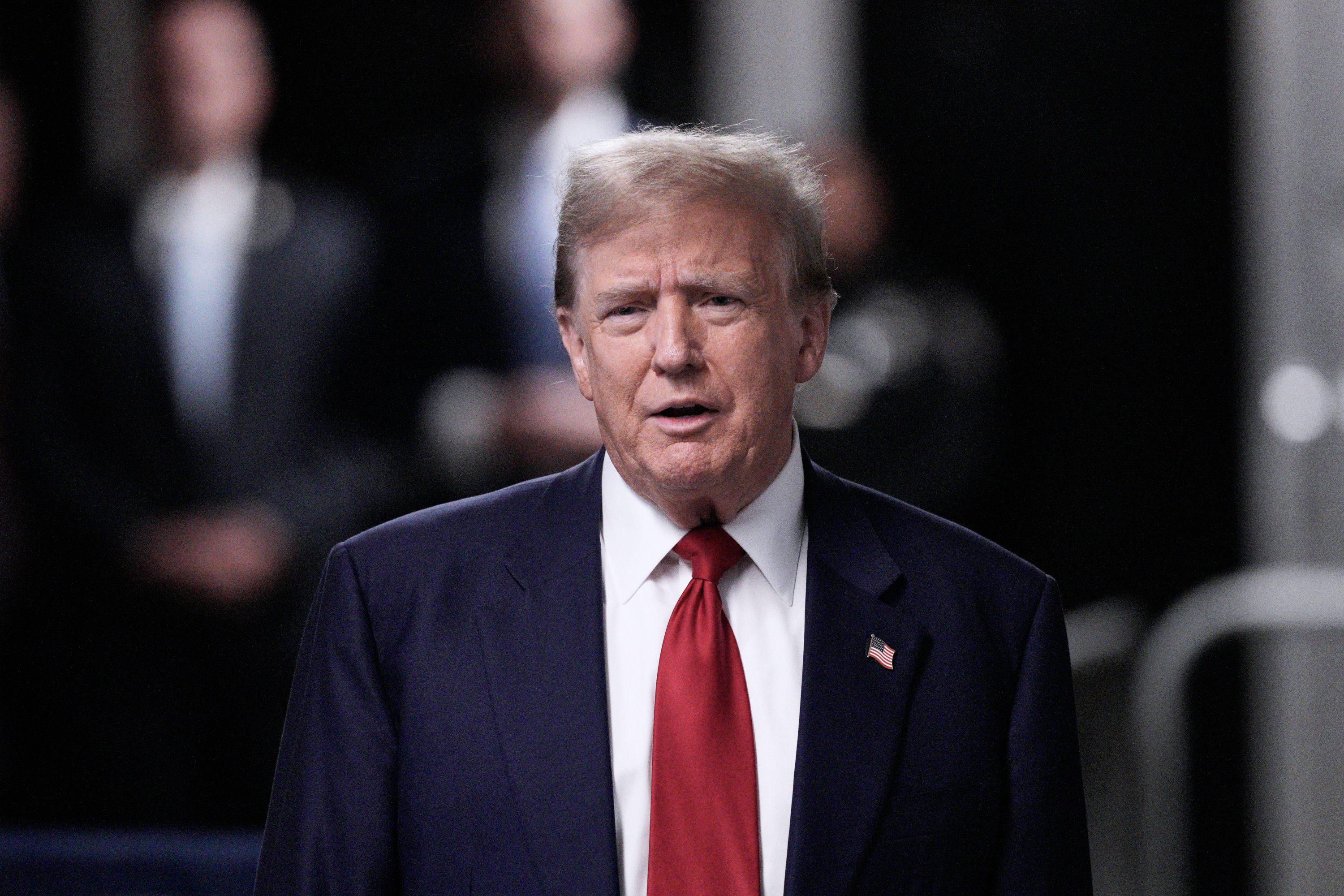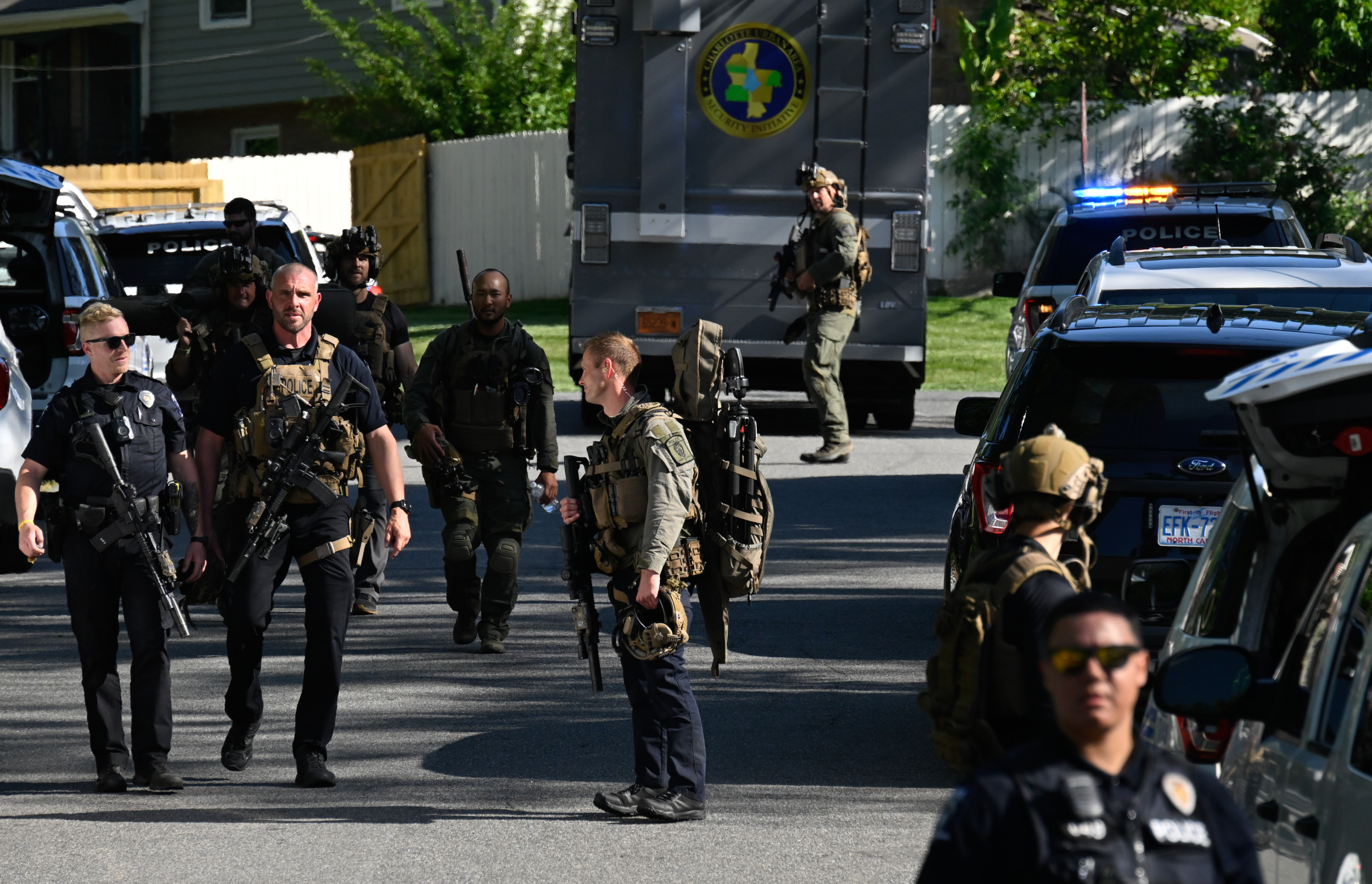Joe Biden might hope his annual St. Patrick's Day celebrations will be a chance to drum up support as his presidential reelection campaign kicks off in earnest.
But while he hobnobs with a number of international politicians including Michelle O'Neill and Emma Little-Pengelly, the first and deputy first ministers of Northern Ireland, the United States president will face anger from some on both sides of Ireland's border who oppose his response to the Israel-Hamas war.
The U.S. has long been an ally of Israel and Biden has supported the country with aid and weaponry. The U.S. has vetoed three United Nations resolutions calling for a ceasefire, despite global criticism. Biden has toughened his approach to Israel in recent months, calling for Israeli Prime Minister Benjamin Netanyahu to allow more humanitarian aid into Gaza, and warning Israel that it faces "strategic defeat" if it allows the humanitarian crisis to continue.
Since the conflict escalated to other countries, the U.S. and its allies have carried out attacks on Houthi bases in Yemen after the Houthis targeted shipping in the Red Sea in response to the war in Gaza.
Biden's approach has caused backlash both in the U.S. and abroad. Some pro-Palestinian demonstrators in the U.S. have called the Democrat "Genocide Joe," and 13 percent of voters declared themselves "uncommitted" in the Michigan Democratic presidential primary last month in protest of the White House's backing of Israel.
Meanwhile politicians in both the Republic of Ireland and Northern Ireland have faced calls to boycott St. Patrick's Day celebrations.
Gerry Carroll, a member of the Northern Ireland legislative assembly for the People Before Profit party, called for a boycott in January, and Colum Eastwood, leader of the country's Social Democratic and Labour Party (SDLP), said he has declined his invitation to celebrations in Washington this year.
Newsweek reached out to representatives for Biden via email for comment.
Eastwood told Newsweek that he had visited Gaza in 2012, where he witnessed death, injury, and the displacement of entire communities.
"It's that direct experience of the horror faced by Palestinians in Gaza that's led to my decision that I can't join St. Patrick's Day events at the White House this year," he said.
"The international community's response to the unimaginable violence in Gaza has been appalling but the U.S. response in particular has been heinously deficient. In those circumstances, I can't drink Guinness, have a bit of craic, and pretend that nothing's happening on the other side of the world.
"I'm not naive about the scale of the impact of our decision not to attend—I don't expect U.S. foreign policy to change as a result. But I think that not attending sends a far stronger message about the depth of feeling in Ireland about the situation in Gaza than 30 seconds with Joe Biden pretending that we can change his mind.
"I sincerely hope that the U.S. administration will move to demand an immediate ceasefire in Gaza to end the monstrous violence soon."
Ireland's response is perhaps unsurprising when considering its geopolitical context. The Republic, in the south, is one of four European Union members that is not part of NATO and is militarily neutral. Some have compared the Palestinian experience with British colonialism in Ireland, and this week, Irish President Michael D. Higgins urged countries to increase aid funding to UNRWA, the U.N. agency that provides aid to Palestinian refugees. Other countries paused aid after allegations that the agency had links to Hamas.
In January, experts told Newsweek that the U.S. risked alienating Ireland over its policy.
Speaking in a plenary session in Strasbourg in January, MEP Clare Daly, who is a member of the left-wing Irish party Independents 4 Change, which is part of the European Parliament group The Left in the European Parliament-GUE/NGL, criticized Biden for authorizing airstrikes on positions held by Iran-backed Houthis inside Yemen.

Eastwood's colleague Claire Hanna, an SDLP lawmaker, told The Washington Post: "The White House St. Patrick's Day event is a party. We have taken the principled position that we won't be attending that party."
She continued: "This is about the deep distress that we and our constituents feel practically every hour of the day about what's going on in Gaza, and our attempt to use whatever opportunities we have — parliamentary and otherwise — to contribute and create international momentum to end this."
Irish Taoiseach Leo Varadkar is among those who will attend the event, despite opposition. He and Biden will take part in a traditional shamrock handover in the Oval Office on Sunday.
But this symbolic exchange will not be without its tensions. During a visit to Boston on Tuesday, Varadkar said he would use the visit to call for a ceasefire. Similarly, in a statement to The Washington Post, republican party Sinn Féin said it was attending to advocate for an end to the war and to strengthen support for Irish peace and reunification.
Dr. Peter McLoughlin, a political lecturer at Queen's University Belfast, said the White House celebrations have become politicized because of the war in Gaza.
"The issue of White House attendance for St Patrick's Day festivities has become hugely politicized in Ireland by Biden's failure to restrain Israel's actions in Gaza," McLoughlin told Newsweek.
"It is ironic that Colum Eastwood, representing the most moderate nationalist party in Northern Ireland, is not attending, whilst the Sinn Féin leader, Mary Lou McDonald, will—particularly given that Sinn Féin supporters have traditionally been amongst the most radically pro-Palestinian voices here.
"However, the Irish historical experience of colonialism makes most Irish people at least sympathetic if not strongly pro-Palestinian, and support the perceived underdog in any conflict," he said.
"That means that McDonald and the Irish Taoiseach, Leo Varadkar, will need to constantly justify their attendance at the White House, stressing that they are using this access to press the U.S. government to do more to achieve peace in the Middle East—and not just pursuing economic and other interests that are also important to Ireland."
Robert Schmuhl, Professor Emeritus of American Studies at the University of Notre Dame and the author of Ireland's Exiled Children, said that while there were "brickbats of criticism" over Biden's approach to Gaza, Ireland and the U.S. still have "important and strong" ties.
"Both at home and abroad, the Biden administration's approach to the carnage in Gaza continues to bring brickbats of criticism," he told Newsweek. "This is certainly the case in Ireland. But policy reservations notwithstanding, Taoiseach Leo Varadkar and other Irish officials will meet with President Biden in the annual joint recognition of St. Patrick's Day at the White House later this week.
"No other foreign country receives the yearly attention in Washington as the Irish do, and, despite serious differences over Gaza, the ties between America and Ireland remain both important and strong. It truly is 'a special relationship,' and one where frank words can be spoken by the leaders of both democracies."
Political tension withstanding, several of Northern Ireland's politicians will still attend the St. Patrick's Day celebrations, including Economy Minister Conor Murphy, Stormont speaker Edwin Poots, Education Minister Paul Givan, and DUP leader Sir Jeffrey Donaldson.
On October 7, the Palestinian militant group Hamas carried out a surprise attack in the south of Israel, killing roughly 1,200 people and taking hostages. The subsequent Israeli military response in Gaza has killed more than 30,000 Palestinians, according to the Associated Press, citing the Gaza Health Ministry.
Correction 03/15/24, 08:23 a.m. ET: This article was updated with corrections to the spelling of Clare Daly and Leo Varadkar.
Uncommon Knowledge
Newsweek is committed to challenging conventional wisdom and finding connections in the search for common ground.
Newsweek is committed to challenging conventional wisdom and finding connections in the search for common ground.
About the writer
Kate Plummer is a Newsweek reporter based in London, U.K. Her focus is on U.S. politics and national affairs, and ... Read more
To read how Newsweek uses AI as a newsroom tool, Click here.








